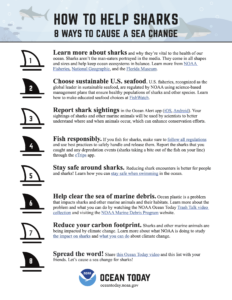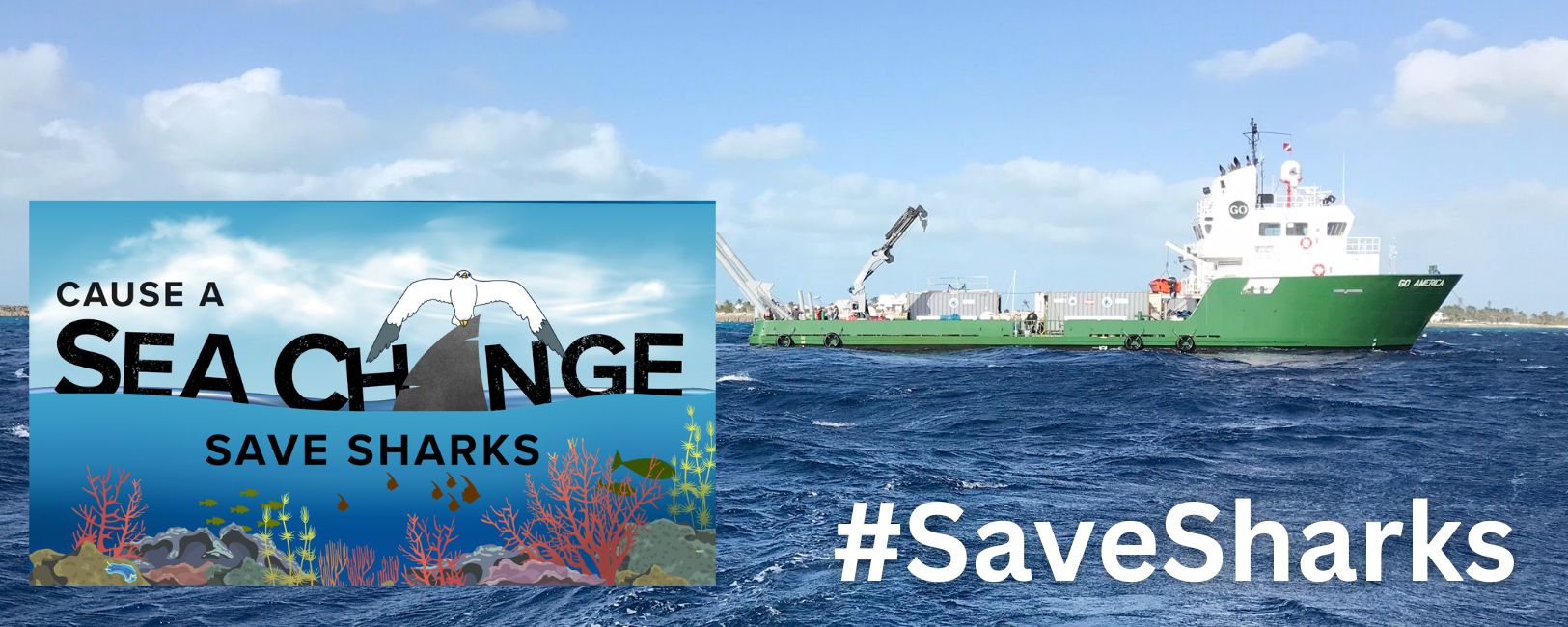Guice Offshore’s Supporting Role in 2020 “Tiger Shark King” Season Was Part of Our Ongoing Marine Conservation Work
It’s Shark Week! Guice Offshore supports conservation efforts to help protect sharks, which are essential to the worldwide marine ecosystem and play a vital role in the health of our oceans.
- Track tagged sharks in real time and enter the Ocearch “Meet A Shark” contest HERE (deadline to enter is Aug. 31, 2023)
Now a week-long program on the Discovery Channel, Shark Week first aired in 1988 as a way to help conserve sharks by correcting public misconceptions about them.
In 2020 through our partner, Global Subdive, Guice Offshore’s multi-purpose vessel GO America played a key role in Shark Week’s “Tiger Shark King” season by supporting the Discovery Channel film crew, which worked aboard while shooting episodes that entailed the launch and recovery of subsea equipment and a submarine.
Now, with so many people thinking about sharks over the summer during Shark Week (which runs this year from Sunday, July 23, 2023 through Saturday, July 29, 2023), NOAA’s (National Oceanic and Atmospheric Administration) National Ocean Service wanted to make sure everyone has all the resources needed to learn more about sharks and how to help these mysterious creatures maintain healthy populations, since many shark species are in decline. By contrast, yet other shark species in some U.S. waters are doing well, thanks to the efforts of NOAA and fishermen.
NOAA created the video “Cause a Sea Change: Save Sharks” (Total Running Time 4:08) to educate about shark conservation success in the U.S., why shark populations are in trouble elsewhere, and what you can do to help them! The agency also created this hyperlinked flyer (click to download the PDF) to share with others on how to help.

Learn more about sharks and why they’re vital to the health of our ocean. Sharks aren’t the man-eaters portrayed in the media. They come in all shapes and sizes and help keep ocean ecosystems in balance. Learn more from NOAA Fisheries, National Geographic, and the Florida Museum.
Choose sustainable U.S. seafood. U.S. fisheries, recognized as the global leader in sustainable seafood, are regulated by NOAA using science-based management plans that ensure healthy populations of sharks and other species. Learn how to make educated seafood choices at FishWatch.
Report shark sightings in the Ocean Alert app (iOS, Android). Your sightings of sharks and other marine animals will be used by scientists to better understand where and when animals occur, which can enhance conservation efforts. You can follow tagged sharks in real-time worldwide at https://www.ocearch.org/tracker/.
Fish responsibly. If you fish for sharks, make sure to follow all regulations and use best practices to safely handle and release them. Report the sharks that you caught and any depredation events (sharks taking a bite out of the fish on your line) through the eTrips app.
Stay safe around sharks. Reducing shark encounters is better for people and sharks! Learn how you can stay safe when swimming in the ocean.
Help clear the sea of marine debris. Ocean plastic is a problem that impacts sharks and other marine animals and their habitats. Learn more about the problem and what you can do by watching the NOAA Ocean Today Trash Talk video collection and visiting the NOAA Marine Debris Program website.
Reduce your carbon footprint. Sharks and other marine animals are being impacted by climate change. Learn more about what NOAA is doing to study the impact on sharks and what you can do about climate change.
Spread the word! Share the Ocean Today video and this list of resources with your friends. Let’s cause a sea change for sharks!
Fast Facts from NOAA’s Ocean Service “Save Sharks” Website
Not all sharks look like the one in Jaws. There are more than 500 species of sharks, ranging in size and shape!
Sharks have been around long before the first dinosaurs appeared on land, swimming the ocean for more than 400 million years.
Jaws author, Peter Benchley, regretted portraying the white shark as a man-eater. He became an ocean and shark conservationist later in life.
In 2021, one person was fatally bitten by a shark while 90 people drowned in rip currents in surf zones in the U.S.
Relative to other marine fish, sharks have slow growth, late sexual maturity, and give birth to a small number of young, making their populations especially vulnerable to overfishing.
Sharks can become bycatch in some commercial fishing practices, which is one reason why it’s important to always choose sustainable seafood.
Learn More About Sharks
Fish & Sharks | NOAA Fisheries
12 Surprising Shark Facts | NOAA Fisheries
Hollywood Sharks vs. Real Sharks | NOAA Sanctuaries
Cape Cod Seals and Sharks | NOAA Fisheries
Scalloped Hammerhead Shark | NOAA Fisheries
Shark Risks & Safety
International Shark Attack File
Shark Safety Tips | State of Hawaiʻi
Sustainable Seafood & Fishing
Fishing Regulations | NOAA Fisheries
Ways to Help
Wildlife Viewing Guidelines | NOAA Sanctuaries
Trash Talk Video Collection | Ocean Today
What You Can Do About Climate Change | EPA
Shark Conservation
Shark Conservation | NOAA Fisheries
Shark Finning Ban | NOAA Fisheries
Sharks in the Sanctuaries | NOAA Sanctuaries
Climate Change & Sharks | NOAA Fisheries
About Guice Offshore’s Work in Marine Conservation, Ocean Research, and Film and Television
Many public and private research institutions, universities, and endowments utilize Guice Offshore service vessels along all U.S. coasts and the Caribbean. Our vessels offer a stable platform from which to conduct experiments and utilize specialized equipment, and our large accommodations can house many scientists and vessel crew simultaneously, and even be converted into floating laboratories. Multi-Purpose Vessels like the GO Pursuit, operating in partnership with Ryan Marine, are especially well-suited for this industry, which often requires an A-frame and winch to deploy acoustic gear into the water column or down to the seafloor.
Movie and television productions are often in need of capable Guice Offshore vessels to film scenes, house crews or transport between sets. Our vessels have participated in the filming of feature films movies Deepwater Horizon and Isolation. GO America was also supporting actor in the TV series Cooper’s Treasure Season 2 and Shark Weeks “Tiger Shark King” episode. Guice Offshore vessels have even been mentioned on national news programs for their participation in life-saving rescues or other offshore recovery missions. With our partners, Submarines and ROVs can be provided to assist with underwater cinematography.

